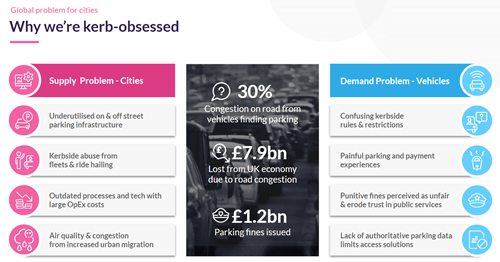Five questions from our webinar audience: Ben Boutcher-West | Appyway

How data can optimise the customer parking journey
During the third webinar of Intertraffic moderator Carlo van de Weijer spoke to Julian O'Kelly of the British Parking Association, Florian Schneeberger of SKIDATA and Ben Boutcher-West of AppyWay on how smart parking can optimise the customer journey. Due to sheer lack of time many questions from our international audience remained unanswered. We asked Ben Boutcher-West of AppyWay to answer a selection of them.
Ben is Head of mobility, kerbside and parking solutions at AppyWay. ‘Parking doesn’t allow for kerb kissing’ or ‘Parking is a failed mobility’ are just some critical but honest quotes Ben Boutcher-West shared during the webinar. This has brought up loads of questions from the audience some of which we will touch on in this article. AppyWay was initiated as a start-up in 2015 with a smart parking tool – to start a parking session with one click and only pay for the minutes parked. In 2019 - after being very successful - they scaled-up and changed the name and brand from AppyParking to AppyWay.
Question 1:
How can we transform the kerb into a valuable, dynamic commodity in a way that improves travel experiences for residents, drivers, businesses, shopping areas as well as for authorities?
Ben: ‘Supporting the Business Innovation Districts and other bodies in the UK is just one example of the partnerships we are looking to make for parking to unlock new opportunities in kerbside management, taking a more integrated approach. Parking both on and off street is largely unintegrated, we see a much customer oriented service if we take a different approach and consider parking as a service to trip purpose.’

Question 2:
What does your ideal kerbside infrastructure look like? And what are the major challenges to get to this ideal kerbside infrastructure? What are the challenges in Automated Kerbside Access Management?
‘A slight Utopia when we look at today’s legislation and street architecture but I like to imagine a blank canvas, where we can all move freely through a city taking digital permits with us wherever we need to be. We will get an Accept / Decline service at our locations and have a destination’s local information visualised to us well before we arrive. A first step is to make parking a planned upfront activity rather than a surprise event at the end of a trip. From this connectivity we can then include all sorts of contextual information, especially from cities and adjust parking to meet city KPI’s such as air quality and congestion.’
‘There are many challenges, the static way in which the laws of England and Wales enforce parking block agility. We also need to ensure inclusivity and while Smart phones and connect cars still rise to meet market saturation, we cannot provide full digital systems that might exclude anyone. We overcome this in a range of ways and are focussed on trying a new approach in certain use cases at a smaller scale. Our work with TfL (Transport for London) for example, explores the future of kerbside management within their road network. Our projects with DCMS in the UK looking at the benefits realisation of 5G in transport also help to bring this future vision to life.’
Question 3:
To establish a good system requires a very good database and excellent internet connections, so how can you ensure that this smart parking can actually work especially in suburb area?
‘This is a great question and part of the reason we are so committed to the DCMS rural programmes in the UK to demonstrate how local connectivity can still benefit from smart car parking systems. It’s true if it is phone based you will need signal but we benefit from the best coverage the sector has seen. Before the consumer experience we need to ensure the network is digitised and this is why our current focus is B2G technology digitising traffic regulation orders via our AppyWay Mapper platform.’

Question 4:
What about the old folk? They barely know how to use Google, do you have other suggestions for them?
‘We recognise that not everyone has a smart phone, this is not just true of older demographics but also for fleet vans who possibly don't give all their drivers expensive smart phones. We have a small Bluetooth key for this which we can issue to a member. It is a small key fob to keep in the car, on arrival near our sensor, press the button and it rings and flashes to confirm a parking session has begun – when you drive away the session ends. This means we have a “one click system” which is especially designed for simplicity to support the elderly or those too busy!’
Question 5:
Different countries have different legislation. To implement this technology, in my opinion we need the same standard in order for this system to work successfully which is very hard to do. In your opinion can these parking facilities be implemented worldwide with different laws and legislation and if so, how?
‘This is a great point, I completely agree. Ultimately we see parking as a demand and supply challenge, common to all cities globally. The laws and local nuances on how parking is managed to cause disruption to large international standards. We are working internationally and locally to bring together a commonality to how parking is digitised and then managed but this will take time. Even in the UK we have 418 local authorities all at different stages in digitisation and kerbside management. I would stress that good parking does not need to wait for standardisation in policy, cities should think about the common components parking needs in future such as:
- Sensing of availability
- Digital traffic regulation orders available as API’s
- Data warehouse for consumers to access
- Change management systems to ensure quality of data is maintainable.'
Bonus question:
Do you sense a trend from on-street towards off-street parking as a part of freeing up the streets in urban areas?
'I am not sure if this is a trend yet but we do recognise an ability for off street parking to attract a different approach much faster than local authorities. This is due to a shorter decision making process and operating in a private market without restriction placed on public services. As such off-street is faster to embrace the customer service offering, wrapping parking, EV charging, membership and subscriptions under one pricing model. On-street parking can take some learning from the existing off-street business models on where the future maybe be for monetising kerbside in towns but the models are very different.'


